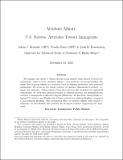Attribute Affinity: U.S. Natives’ Attitudes Toward Immigrants
Author(s)
Berinsky, Adam; Rizzo, Tesalia; Rosenzweig, Leah R.; Heaps, Elisha
Download11109_2018_9518_ReferencePDF.pdf (332.2Kb)
Open Access Policy
Open Access Policy
Creative Commons Attribution-Noncommercial-Share Alike
Terms of use
Metadata
Show full item recordAbstract
We examine the extent to which relevant social identity traits shared between two individuals—what we term “attribute affinity”—can moderate out-group hostility. We argue that in-group affinity is a powerful force in shaping preferences over potential immigrants. We focus on two closely related, yet distinct, dimensions of identity: religion and religiosity. Using evidence from three surveys that included two embedded experiments, we show that sharing strength in religious practice can diminish strong aversion to immigrants of different religious affiliations. We find that, among highly religious U.S. natives, anti-Muslim bias is lower toward very religious Muslims, compared to non-religious Muslims. This attenuating effect of attribute affinity with respect to religiosity on anti-Muslim bias presents the strongest evidence supporting our argument.
Date issued
2018-12Department
Massachusetts Institute of Technology. Department of Political ScienceJournal
Political Behavior
Publisher
Springer Science and Business Media LLC
Citation
Berinsky, Adam J. et al. "Attribute Affinity: U.S. Natives’ Attitudes Toward Immigrants." Political Behavior 42, 3 (December 2018): 745–768 © 2018 Springer Science Business Media, LLC
Version: Author's final manuscript
ISSN
0190-9320
1573-6687